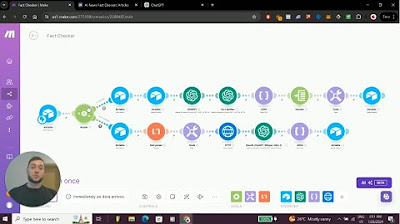Online Verification Skills — Video 4: Look for Trusted Work
Summary
TLDRThe video script emphasizes the importance of developing fact-checking habits for competent web readers. It advises investigating the source of information, seeking original reporting, and building a library of trusted sources to lean on. The script uses the example of the Canada Child Benefit and how fact-checking sites like Snopes provide a starting point for verification. It also encourages 'trading up' to higher quality sources and demonstrates how to find reliable news using search techniques, stressing the value of professional reporting in fact-checking.
Takeaways
- 🕵️♂️ Investigate the source: Competent web readers always check the credibility of a source, especially when encountering unfamiliar websites or organizations.
- 🔍 Go to the original article: To avoid misinformation, it's important to find and read the original reporting rather than relying on re-reporting or secondary sources.
- 📚 Build a library of trusted sources: Fact-checkers develop a collection of reliable sources that they can rely on for verification, saving time and effort.
- 🤔 Evaluate fact-checking claims: Even if a fact-checking site labels a claim as misleading, it's crucial to consider the evidence and reasoning behind their conclusion.
- 📝 Fact-checking involves thorough work: Fact-checkers perform extensive research, including contacting relevant authorities and experts to verify claims.
- 🔑 Choose quality fact-checking sites: It's essential to select fact-checking sources that are reputable and have a history of accurate verification, like Snopes.
- 👮♂️ Trust in professional reporting: Traditional news outlets are often reliable because professional reporters are trained in fact-checking and are expected to verify their stories.
- 🛍️ Trade up to higher quality sources: Instead of relying on the first source found, seek out and use higher quality, more reliable sources for information.
- 🔎 Use search engines effectively: Utilize search engines to find coverage of a story from trusted sources, which can be prioritized by including their names in the search query.
- ❄️ Example of 'trading up': The script provides an example of verifying a story about snow in the Sahara by looking for reports from reputable sources like NPR, CNN, and Forbes.
- 🛡️ Fact-checking as a preventive measure: By employing these fact-checking techniques before engaging with content, you can ensure that your time is spent on credible stories and avoid being misled.
Q & A
What are the two habits of competent web readers mentioned in the script?
-The two habits are investigating the source, especially when it is unfamiliar, and going back to the original article that did the primary work and talked to experts and witnesses.
Why is it important to build a fact-checking habit over time?
-Building a fact-checking habit helps you accumulate a library of trusted sources, which can save you the effort of verifying information yourself, as these sources have already done the verification work for you.
What is an example of a site that can be used for fact-checking?
-FactsCan is mentioned as an example of a site that can be used for fact-checking.
What was the claim made by FactsCan about the Canada Child Benefit that was considered misleading?
-FactsCan claimed that the Canada Child Benefit was misleading because it was predicted to lift hundreds of thousands of children out of poverty, but the actual effect was not yet confirmed.
What does the script suggest as a way to start understanding a claim or story?
-The script suggests skimming through a fact-checking article to see the work done by the fact-checkers, such as emails to relevant authorities and interviews with experts, as a starting point for understanding a claim or story.
Which fact-checking site is mentioned as a go-to source in the script?
-Snopes is mentioned as a go-to source for fact-checking due to its long-standing reputation in the business.
Why should one not rely solely on a source that initially comes to them?
-One should not rely solely on the initial source because it may not be of high quality or may not have done thorough verification. Fact-checkers often 'trade up' to a higher quality source for more reliable information.
What is the term used in the script for seeking out higher quality sources instead of relying on the initial source?
-The term used for this practice is 'trading up'.
How can one find coverage from trusted sources online?
-One can use a search engine like Google, search for the topic, and then hit the news tab to find well-researched stories from trusted sources.
What is a simple way to prioritize a favorite fact-checking site or publication in search results?
-You can prioritize a favorite site by typing the name of the site after the search term, which will float that site to the top of the search results.
What is the main point of the script regarding fact-checking and source evaluation on the web?
-The main point is that by investigating sources, going to the original reporting, and looking at trusted work before investing time in reading or watching content, one can ensure they are engaging with quality stories and avoid being misled.
Outlines

This section is available to paid users only. Please upgrade to access this part.
Upgrade NowMindmap

This section is available to paid users only. Please upgrade to access this part.
Upgrade NowKeywords

This section is available to paid users only. Please upgrade to access this part.
Upgrade NowHighlights

This section is available to paid users only. Please upgrade to access this part.
Upgrade NowTranscripts

This section is available to paid users only. Please upgrade to access this part.
Upgrade NowBrowse More Related Video

a $24 e-reader changed my life (and why you need one too)

How to Spot Fake News - FactCheck.org

Create Blogs in Seconds Using Perplexity AI

Relevance and Truthfulness of Ideas || GRADE 9 || MELC-based VIDEO LESSON | QUARTER 3 | MODULE 2

The Worldwide War on Truth - Operation InfeKtion (3) NY Times

Literasi Digital - Ekosistem Periksa Fakta dan Cara Penerapannya
5.0 / 5 (0 votes)